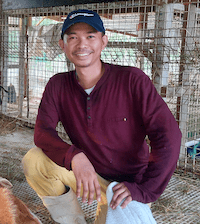The Department of Agriculture (DA) reported that the damage inflicted on Philippine agriculture due to Super Typhoon Egay (international name: Doksuri) has now tallied a staggering P4.66 billion. This information was disclosed on Monday in a bulletin issued by the agency.
A total of 187,225 farmers and fisherfolk have been adversely affected by the typhoon. The extensive impact covers an expanse of 158,995 metric tons (MT), spanning over 200,456 hectares of Philippine agriculture.
The commodities that have borne the brunt of this disaster encompass rice, corn, high-value crops, livestock and poultry, as well as fisheries. Additionally, essential components of Philippine agriculture and fishery sectors, such as irrigation systems, agricultural infrastructure, and fishing equipment, have been adversely affected by the typhoon.
Numerous regions have been impacted by this devastation, including the Cordillera Administrative Region, Ilocos, Cagayan Valley, Central Luzon, Calabarzon, Mimaropa, Western Visayas, Zamboanga Peninsula, Soccsksargen, and Caraga.
Within these regions, rice crops have suffered damages amounting to P1.79 billion, with a corresponding loss of 42,778 MT in Philippine agriculture production volume. This equates to about 0.22% of the annual output target for rice production.
The typhoon has also inflicted destruction on various other fronts. Farm and irrigation infrastructure, high-value crops, livestock, poultry, and fisheries have all incurred significant monetary losses — P356 million for infrastructure, P314.11 million for high-value Philippine agriculture crops, P157.32 million for livestock and poultry, and P175.39 million for fisheries.
Given the dire circumstances, farmer groups have unequivocally appealed for immediate assistance and rehabilitation efforts from the government. According to Kilusang Magbubukid ng Pilipinas Chairman Danilo H. Ramos, the aftermath of Super Typhoon Egay has presented two primary challenges: substantial losses in both Philippine agriculture and fishery production, as well as escalating prices for essential food items.
Mr. Ramos conveyed this sentiment through a statement, in which he emphasized the need for proactive measures to address these pressing Philippine agriculture issues. He further emphasized the urgency of their demands for help and rehabilitation, particularly a cash aid of P25,000 to aid farmers and fishers who have suffered losses. The recovery process necessitates long-term assistance, encompassing the restoration of housing, crops, fishing vessels, and livelihoods that were ravaged by the flood.
Marina Cavan, spokesperson of the National Network of Agrarian Reform Advocates-Youth, echoed the urgency of the situation in a separate statement. She stressed that the plight of farmers and fishers should not be overlooked, urging the government to act decisively in their support.
In response to these circumstances, the DA has outlined plans to distribute resources for Philippine agriculture recovery. A sum of P65.3 million in rice seeds and fertilizers, P94.7 million in corn seeds and pesticides, and P39.6 million in assorted vegetable seeds will be allocated. Additionally, aid in the form of tilapia, carp, and catfish fingerlings worth P62,000, as well as fuel assistance worth P5.9 million, will be provided to affected fisherfolk. Moreover, the government has committed to restoring damaged motorized boats, with a budget of P1.9 million allocated for repairs.

Mr. Jaycee de Guzman is a self-taught agriculturist and the founder and patriarch of Alpha Agventure Farms, recognized as the leading backyard farm in the Philippines. With a rich background in livestock farming dating back to the early 1990s, Mr. de Guzman combines his expertise in agriculture with over 20 years of experience in computer science, digital marketing, and finance. His diverse skill set and leadership have been instrumental in the success of Alpha Agventure Farms.


